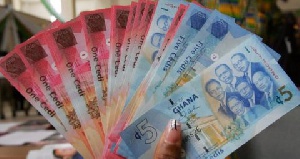The appreciation of the Cedi will not be sustainable, the Ghana Growth and Development Platform (GGDP)–a group of economists and economic analysts, has said.
GGDP in a statement signed by Interim Chairman, Kwamena Essilfie Adjaye, said the factors contributing to the appreciation of the local currency are not long lasting.
The group has proposed that the government take certain medium and long term measures to cement the Cedi’s strength.
It put the rise of the Cedi down to “the use of the formal foreign exchange market, the banks and the forex bureau”, which the group says “has increased since the Bank of Ghana (BoG) revised its measures in August 2014”, as well as: “The prospect of an IMF facility after government announced its intention to go for a facility in August 2014”.
The other factors include: The US$1b Eurobond issued by the government on September 11, 2014 with a coupon rate of 8.125, which was oversubscribed by US$2b; the US$1.7b Cocobod syndicated foreign loan signed by COCOBOD for purchasing an estimated 900,000 tons of cocoa in the 2014 to 2015 season, which also was oversubscribed by 15%’ and an additional US$200m that can be drawn on demand in April-May 2015.
“These three developments have led to expectation of an increase in the supply of foreign currencies and are indeed increasing the supply of US Dollars in the formal foreign exchange market”, GGDP said in its statement issued Wednesday.
“But this new found strength of the Cedi is not sustainable – cannot be sustained – because:
1) The above stated contributing factors, which are increasing the supply of foreign exchange cannot be sustained, as the BoG may complete revision of its measures and there will not always be an IMF facility; as there will not always be a Eurobond; and as the Cocobod syndicated foreign loan happens only once a year, in late August to early September.
2) Towards the end of every year there is a seasonal increase in the demand for Dollars and other foreign currencies for purchasing goods and services for the end of year festivities”.
GGDP therefore suggests that “certain steps must be taken urgently to ensure sustainable increase in the supply of foreign exchange that will contribute to long-term strength of the Cedi”.
Below are the long-term measures proposed by the Platform:
While the Cedi is appreciating the BoG and the government must take the following recommended bold actions in the short term “to increase the supply of foreign exchange.”
A. Foreign Exchange Bonds:
“Float special foreign exchange bonds targeted at resident and non-resident Ghanaians who have foreign exchange. It should woo the diasporan community seriously to invest back home by investing in these bonds, instead of the usual Moneygram and Western Union remittances, which declined last year. Competitive coupon redemption rates ex-market inflation and net transfer costs should be offered for these bonds. And, like done for the Eurobond, these bonds must be exclusively utilised for clearly scoped out infrastructure projects which can generate enough returns to pay off the maturing debt obligations.”
B. Pre-export Finance:
“Year in year out there are export orders with exporters that cannot be filled largely because of lack of pre-export finance. A considerable amount of export revenue can be earned if these exports could be made. To address this problem, the BoG and the government should encourage and support banks, the Export Development and Agricultural Investment Fund (EDAIF), the Ghana Export Promotion Authority (GEPA), and Export Finance Company (EFC) to provide pre-export finance, and to do so on time, in line with the export schedule in the export contracts.”
C. Forward Foreign Exchange Trading:
“Encourage the development of a forward foreign exchange market as recommended by the 1996 study. SCB and other banks started trading forward after the study. The issues and problems that subsequently made the banks suspend forward trading should be addressed so that forward trading can recommence, as it could become one of the major ways of minimising Cedi depreciation. Forward trading allows major sellers (exporters) and buyers (importers) of foreign exchange to plan their sales and purchases forward, consequently reducing spot demand, the major cause of depreciation (and appreciation).”
The BoG must also take the GGDP’s four bold steps recommended to “encourage use of the banking system.”
Third, in the medium to long term, to ensure long-term strength of the Cedi, the government must implement the twin strategies of export-led growth and import-substitution.
Business News of Wednesday, 1 October 2014
Source: starrfmonline.com
Cedi rise won’t last, sustainable measures needed – GGDP
Opinions












